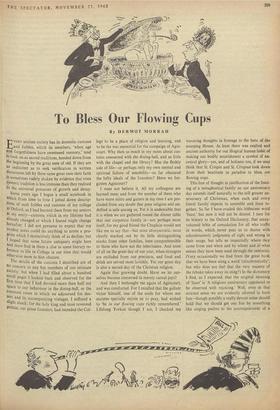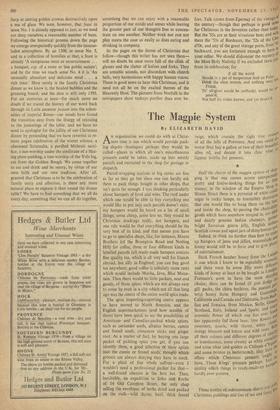To Bless Our Flowing Cups
By DERMOT MORRAH
EVERY ancient society has its domestic Customs and foibles, which its members, 'when age and forgetfulness have sweetened memory,' tend to look on as sacred traditions, handed down from the beginning by the great men of old. If they are so indiscreet as to seek verification in written documents left by these same great men their faith is sometimes rudely shaken by evidence that even esoteric tradition is less immune than they realised to the universal processes of growth and decay.
Some years ago I began a small notebook in Which from time to time I jotted down descrip- tions of such foibles and customs of my college at Oxford, as 1 had learned them from my seniors at my entry—customs which in my lifetime had already changed or which I feared might change hereafter. I did not presume to expect that my modest notes could do anything to arrest a pro- gress which I instinctively think of as decline; but I hoped that some future antiquary might here and there find in them a clue to some literary re- ference to life in College in our time that would otherwise seem to him obscure. The details of the customs I described are of no concern to any but members of our intimate society; but when I had filled about a hundred small pages I looked back and observed for the first time that I had devoted more than half my space to our behaviour in the dining-hall, or the common room to which we adjourned for des- sert and its accompanying vintages. I suffered a slight shock; for the holy king and most reverend prelate, our pious founders, had intended the Col- lege to be a place of religion and learning, and to be the war memorial for the campaign of Agin- court. Why then so much in my notes about cus- toms connected with the dining-hall, and so little with the chapel and the library? Has the fleshly side of life—or perhaps only my own mental and spiritual failure of sensibility—so far obscured the lofty ideals of the founders? Have we for- gotten Agincourt?
I must not believe it. All my colleagues are learned men; and from the number of them who have worn mitre and gaiters in my time I am pre- cluded from any doubt that pure religion and un- defiled is safe among us. Yet it is undeniable that it is when we are gathered round the dinner table that our corporate family is—not perhaps most itself, for my good friend the Chaplain would not like me to say that—but most idiosyncratic, most clearly marked out by its little distinguishing marks from other families, least comprehensible to those who have not the inheritance. And most of all on the great day of our year, when strangers are excluded from our precincts, and food and drink are served most lavishly. Yet our great day is also a sacred day of -the Christian religion.
Again that gnawing doubt. Have we let our- selves become immersed in merely carnal joys?
And then I bethought me again of Agincourt, and was comforted. For I recalled that the gallant victor himself, one of the souls for whom our statutes specially enjoin us to pray, had wished to 'be in our flowing cups richly remembered.' Lifelong Yorkist though I am, I checked my
wavering thoughts in homage to the hero of the usurping House. At least there was exalted and ancient authority for our illogical human habit of making our bodily nourishment a symbol of an- cestral glory—yes, and of holiness too, if we may think that St. Crispin and St. Crispian look down from their beatitude in paradise to bless our flowing cups.
This line of thought in justification of the feast- ing of a metaphorical family on our anniversary day extends itself naturally to the still greater an- niversary of Christmas, when each and every literal family expects to assemble and feast to- gether. So far I have evaded this iridescent word 'feast,' but now it will not be denied. I turn for its history to the Oxford Dictionary, that many- volumed bible of consolation for all who traffic in words, which. never puts us to shame with schoolmasterly judgments of right and wrong in their usage, but tells us impartially where they came from and when and by whom and in what senses they have been used through the centuries. (Very occasionally we find from the great book that we have been using a word `catachresticaily'; but who does not feel that the very majesty of the rebuke takes away its sting?) In the dictionary I find, as I expected, that the original meaning of 'feast' is 'A religious anniversary appointed to be observed with rejoicing.' Well, even in that strictest sense we are evidently allowed to have fun—though possibly a really devout sense should hold that we should get our fun by something like singing psalms to the accompaniment of a harp or casting golden crowns destructively upon a sea of glass. We note, however, that feast in sense No. 1 is already opposed to fast, so we need not deny ourselves a reasonable number of buns. Following the historical process down the page we emerge unexpectedly quickly from the incense- laden atmosphere. By An 1200. at sense No. 3, and in a collection of homilies at that, a feast is already 'A sumptuous meal or entertainment ... a banquet, esp. of a more or less public nature'; and by the time we reach sense No. 4 it is 'An unusually abundant and delicious meal . . . a rich treat.' Here surely is the family Christmas dinner as we know it, the beaded bubbles and the groaning board; and the date is still only 1393. For six centuries at least—for much more no doubt if we traced the history of our word back through its Latin ancestor festum into the solem- nities of imperial Rome—our minds have found the transition easy from the liturgy of rejoicing to the junketings of the table; and we have no need to apologise for the jollity of our Christmas dinner by pretending that we have reverted to re- mote pagan celebration of the winter solstice, a chastened Saturnalia, a purified Mithraic sacri- fice, a sun-worship under the similitude of a blaz- ing plum-pudding, a tree-worship of the Yule log, cut from the Golden Bough. We come together to eat and drink and be merry, by virtue of our own faith and our own tradition. After all, granted that Christmas is to be the celebration of family unity and affection, is there any more natural place to express it than round the dinner table? We have to find something that we all do every day, something that we can all do together, something that we can enjoy with a reasonable proportion of our minds and senses while leaving the greater part of our thoughts free to concen- trate on one another. Neither work nor rest nor play meets the case so easily as does eating and drinking in company.
So the pages on the theme of Christmas that follow—though this writer has not seen them— will no doubt be once more full of the clink of glasses and the clatter of knives and forks. They are amiable sounds, not discordant with church bells, very harmonious with happy human voices. There is good news to hear this Christmas, and it need not all be on the exalted themes of the Heavenly Host. The pictures from Norfolk in the newspapers show turkeys portlier than ever be-
fore. Talk comes from Epernay of the vintage 01 the century—though that perhaps is good heWs for Christmas in the Seventies rather than todaY. But the '55s are at their vivacious best; and with them the '53s of Bordeaux, the '52s of the COO, d'Or, and any of the great vintage ports, from '4' backward, you are fortunate enough to have in your cellar. We should dishonour the mystery g the Most Holy Nativity if we excluded these Os from its celebration; for
if all the world
Should in a pet of temperance feed on Pulso, Drink the clear stream, and nothing weal b°` Frieze, Th' all-giver would be unthankt, would be un- prais'd,
Not half his riches known, and yet despis'd.











































































 Previous page
Previous page